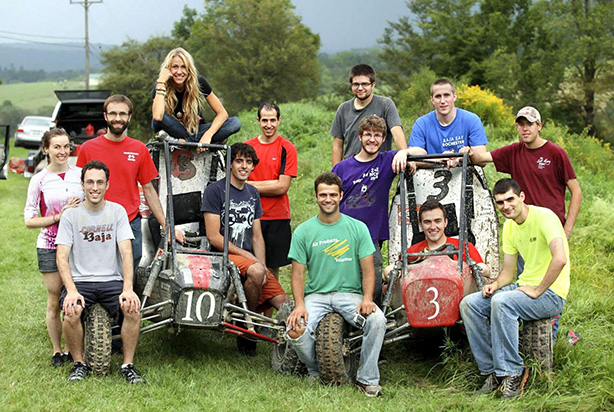Campaign News
CAMPAIGN NEWS
Crowdfunding at Cornell: a slowly budding flower
The Cornell Baja Racing Team seized the Iron Team Award at an international competition in Peoria, Illinois, in June. Image: provided.
You're on your smartphone, riding the train to work or sitting in a chair in the sand at the shore. You're scrolling. "This looks interesting," you think, as a short video starring students catches your eye. Cornell's Autonomous Underwater Vehicle team, you learn, is trying to raise $10,000 for travel and electronics equipment. The team is several dozen young students from three Cornell colleges who work together to build functional robots that can navigate underwater and to compete in international competitions. "Sure," you think to yourself, "I'll chip in $100 to help make that amazing educational experience available." Andrew Gossen. See larger image In 2013, Cornell's Division of Alumni Affairs and Development made its first foray into online crowdfunding campaigns, launching seven mini-campaigns, including one for the autonomous vehicle team and campaigns in support of a student-run organic farm, an LGBT leadership academy, the Latino Studies Program, AguaClara (water filtration systems for Honduras and India, built and installed by Cornell students), the Baja racing team and a global health program. The goals for each campaign were relatively modest, ranging from $10,000 to $30,000, and all reached their goals within the allotted four-week window of time. "Forty percent of the alumni who supported the projects," explains Andrew Gossen, senior director for social media strategy for AAD, "were first-time donors to Cornell, including a substantial number of young alumni. By providing a platform that makes it possible to support projects like these, we're offering a giving opportunity that is inducing some people to respond and make a first gift. We don't know yet if support for crowdfunding projects will translate to broader support for Cornell down the road, but we're optimistic that if people have a positive experience, they may be open to giving again." Donations through crowdfunding platforms (like Kickstarter and Indiegogo) exploded in 2013, reaching an estimated $5 billion worldwide Ð though that $5 billion is only a tiny sliver of the $416 billion that was donated to charity in the United States alone in 2013. Person using smartphone. Image: iStockphoto. See larger image Crowdfunding is a very different kind of fundraising than methods usually employed by universities. Cornell, like its peers, raises a considerable amount of money through more traditional methods, including direct mail, email and student phoning campaigns focused on the significant needs for unrestricted and current-use support at the university. Is this the wave of the future? How soon will these online campaigns replace (or will they ever replace) the traditional outreach asking for unrestricted annual gifts? According to Joe Lyons '98, senior director of the Cornell Annual Fund: "When email emerged in the '90s, it didn't replace other methods of fundraising, though it certainly has become an increasingly important part of our outreach. I view crowdfunding in a similar light. I believe this isn't a case of one or the other. "Crowdfunding adds a new approach to our fundraising strategy and helps meet specific needs," he says, describing it as complementary to Cornell's other efforts.
